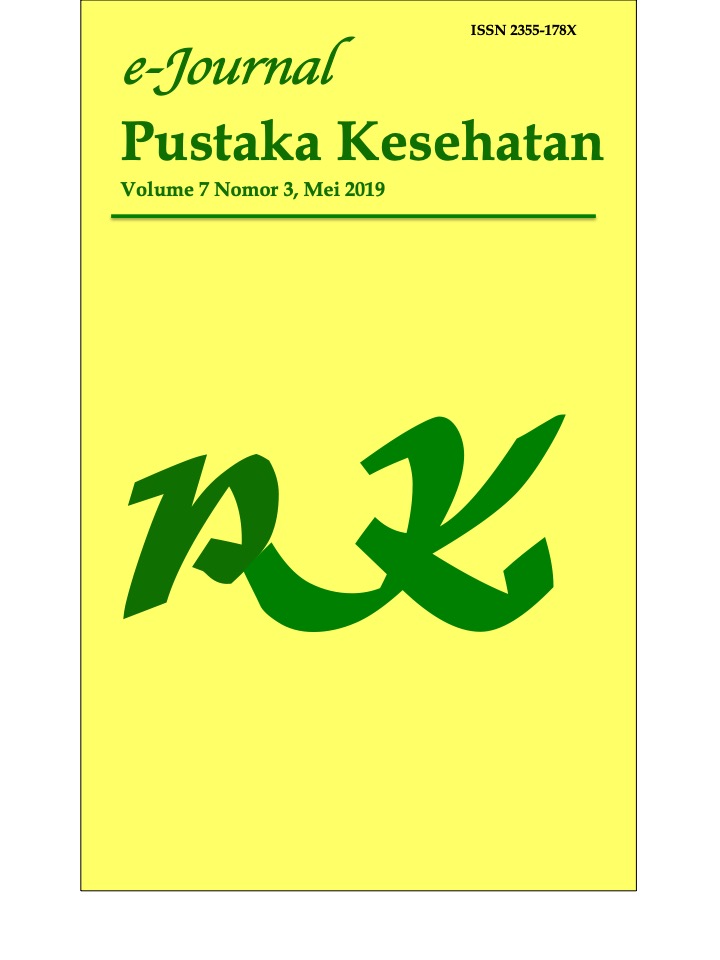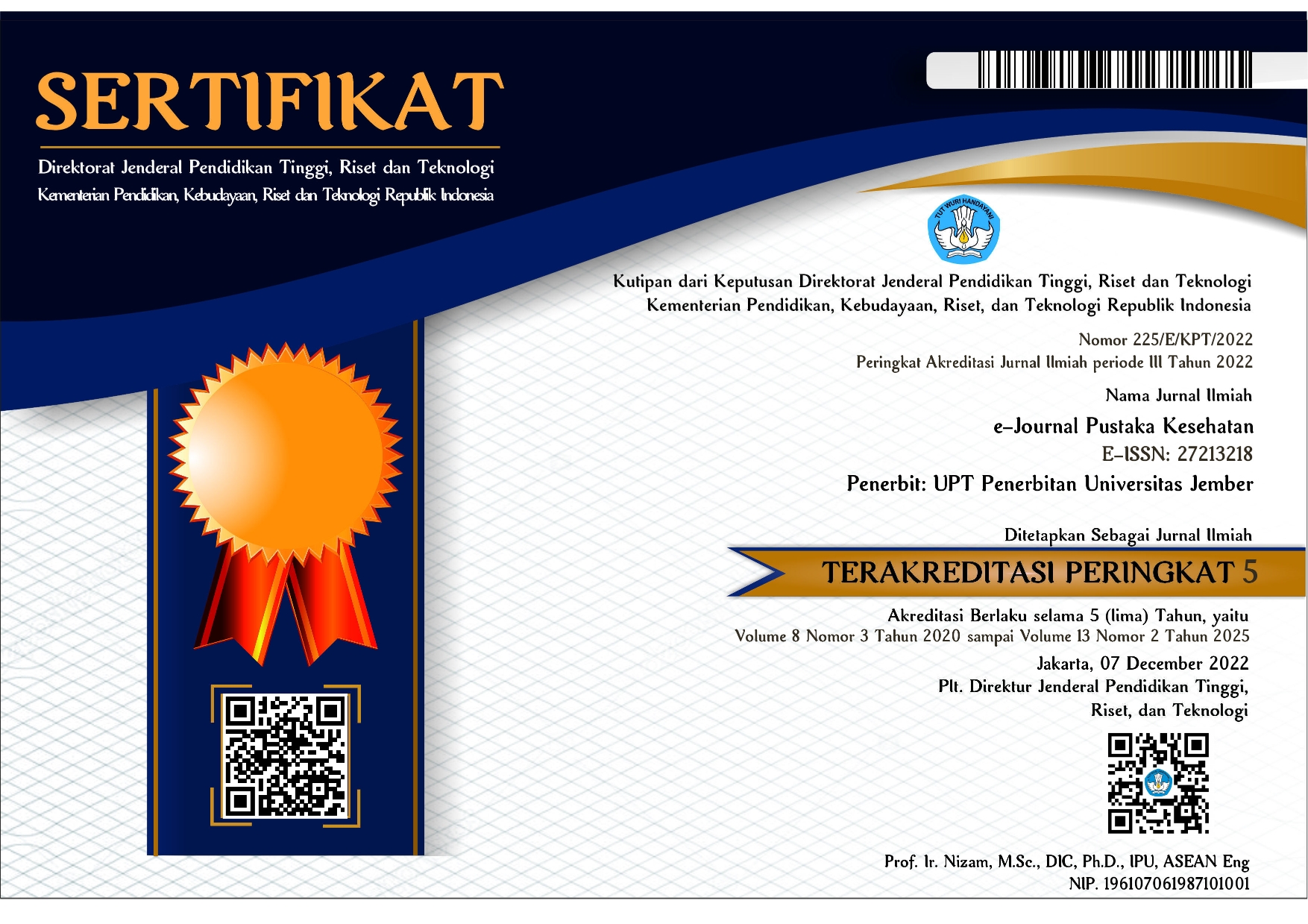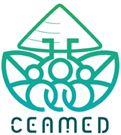Daya Hambat Ekstrak Daun Kakao (Theobroma Cacao L.) terhadap Pertumbuhan Candida Albicans
DOI:
https://doi.org/10.19184/pk.v7i3.10824Keywords:
Candida albicans, maceration, candidiasis, disc diffusion method.Abstract
Candidiasis is an infection caused by overgrowth of Candida species in the oral cavity dominated by C. albicans. One way to inhibit the growth of the fungi is by utilizing medical plants that contain antifungal compounds. Cocoa leaves is a plants that has antifungal compounds such as caffeine, flavonoids and alkaloids. The aim of study was analyzing the effect of cocoa leaf extract on the growth of C. albicans and determining the optimal concentration of cocoa leaf extract in inhibiting the growth of C. albicans. The study used macerated cocoa leaf extract. The inhibitive testing method conducted by disc diffusion method. The concentrations of cocoa leaf extract were 25%, 50%, 75%, 100%, and nystatin was used as positive control and aquadest was negative control. All were possed on the disc and further incubated for 24 hours. The inhibition effect was measured by a caliper. Cocoa leaf extract can inhibit the growth of C. albicans, and the largest co-concentration in inhibiting C. albicans was 100%.
Downloads
References
[2] Grenbeerg MS, Glick M, Ship JA. Burket’s Oral Medicine. 11th Edition. Canada: BC Decker Inc Hamilton. 2008.
[3] Dangi, YS, Soni M, Namdeo. 2010. Oral Candidiasis: A Review. International Journal Of Pharmacy And Pharmaceutical Sciences. 2010; 2(4): 36-39.
[4] Maharani S, Santoso O. Pengaruh Pemberian Larutan Ekstrak Siwak (Salvadora persica) Pada Berbagai Konsentrasi Terhadap Pertumbuhan Candida albicans. Jurnal PDGI. 2012; 61(2):61-64.
[5] Sulistiawati D, Mulyati S. Uji Antijamur Infusa Daun Jambu Mete (Anacardium occidentale) terhadap Candida albicans. Biomedica. 2009; 2(1): 337-339.
[6] Candrasari A, Romas MA, Hasbi M, Astuti OR. Uji Daya Antimikroba Ekstrak Daun Sirih Merah (Piper Crocatum Ruiz dan Pav.) terhadap Pertumbuhan Staphylococcus aureus ATCC 6538, Eschericia coli ATCC 11229 dan Candida albicans ATCC 10231 secara In Vitro. Biomedika. 2012; 4(1): 9-16.
[7] Janzen SO. Chemistry of Coffe.Hamburg: Elsevier. 2010.
[8] Rahmawati W, Winarsih S, Nurdiana. Pengaruh Ekstrak Etanol Daun Kopi Robusta terhadap Pertumbuhan Candida albicans secara invitro. 2013.
[9] Notoatmodjo S. Metodologi Penelitian Kesehatan. Jakarta : Rineka Cipta. 2010.
[10] David WW, Stout TR. Disc Plate Method of Microbiological Antibiotic Assay. Appl Microbiol. 1971; 22(4):659-665.
[11] Dewi FK. Aktivitas Antibakteri Ekstrak Etanol Buah Mengkudu (Morinda citrifolia L.) terhadap Bakteri Pembusuk Daging Segar. Skripsi. Surakarta: Universitas Sebelas Maret. 2010.
[12] Ajizah A, 2004. Sensitivitas Salmonella typhimurium terhadap Ekstrak Daun Psidium Guajava L. Bioscientiae, 2004; 1 (1): 31-38.
[13] Lamothe RG, Mitchell G, Gattuso M, Diarra MS, Malouin F, Bourab K. Plant antimicrobial agents and their effects on plant and human pathogens. Int J Mol Sci. 2009; 10(8): 19
[14] Putri AMS. Efek Antifungi Ekstrak Daun Kenikir (Cosmos caudatus Kunth.) Terhadap Pertumbuhan C. albicans Secara In Vitro. Skripsi. Surakarta: Fakultas Kedokteran Universitas Sebelas Maret Surakarta. 2015.
[15] Jung WS, Chung K, Ahmad A. In Vitro Antioxidant Activity, Total Phenolics and Flavonoids From Celery Leaves. JMPR. 2011; (5): 7022-7030.
[16] Michel GW. Analytical profiles of drug substances. New Jersey: Academic Press, 1972.
[17] Ermayanti A. Pengaruh Pemberian Profilaksis Nistatin Terhadap Kandidiasis Oral Pada Neonatus Di HCU Neonatus. Tesis. Surakarta: Program Pascasarjana Universitas Sebelas Maret. 2014.
[18] Kicklighter, S. D. Antifungal Agents and Fungal Prophylaxis in The Neonate. Neo Reviews. 2002; 3:249-254.
Downloads
Published
Issue
Section
License
e-Journal Pustaka Kesehatan has CC-BY-SA or an equivalent license as the optimal license for the publication, distribution, use, and reuse of scholarly work. Authors who publish with this journal retain copyright and grant the journal right of first publication with the work simultaneously licensed under a Creative Commons Attribution-ShareAlike 4.0 International License that allows others to share the work with an acknowledgment of the work's authorship and initial publication in this journal.







